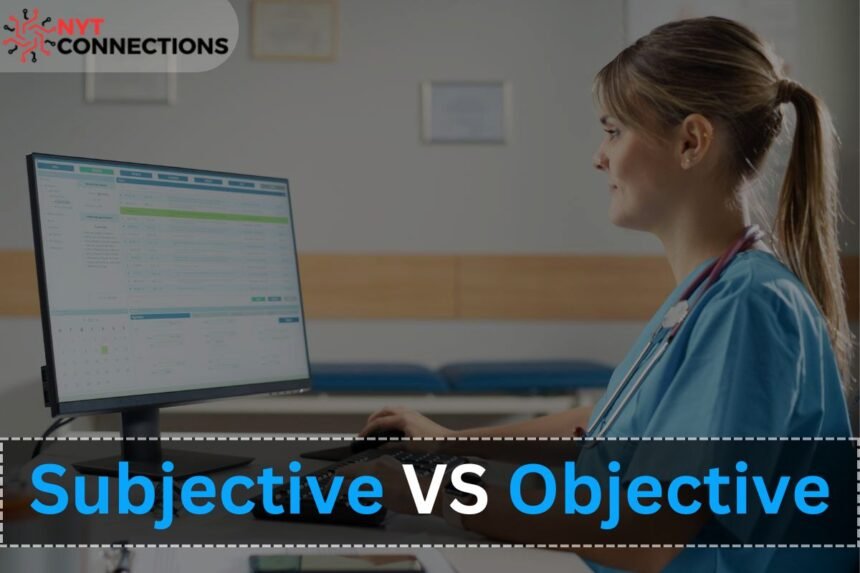The terms subjective and objective often come up in conversations, academic discussions, and daily decision-making. But what do they truly mean, and why is it important to understand the difference? In simple terms, subjective perspectives are shaped by personal opinions and emotions, while objective perspectives rely on facts and evidence. Both play a crucial role in our lives, influencing how we think, communicate, and interact with the world.
This article will explore these concepts in depth, with practical examples, comparisons, and real-world applications. By the end, you’ll have a clearer understanding of subjective vs objective, helping you make more informed decisions and communicate effectively.
What Does Subjective Mean?
Subjective refers to anything that is influenced by personal feelings, opinions, or preferences. It is inherently individualistic and varies greatly from one person to another. Subjective views often reflect emotional or experiential aspects rather than universal truths.
Key Characteristics of Subjective Perspectives
- Emotion-Based: Shaped by personal feelings and reactions.
- Individualistic: Influenced by unique experiences or cultural backgrounds.
- Flexible: May change over time or in different contexts.
Examples of Subjective Statements
- “I believe this is the best movie ever made.”
- “The sunset looks more beautiful today than yesterday.”
- “I don’t enjoy spicy food.”
These statements are valid for the individuals expressing them but cannot be universally applied.
What Does Objective Mean?
Objective, on the other hand, refers to perspectives or information that are based on factual evidence and are free from personal bias. Objective thinking relies on measurable data and universal truths that remain consistent across different observers.
Key Characteristics of Objective Perspectives
- Fact-Based: Grounded in verifiable data and observations.
- Universal: Applicable to everyone, regardless of personal feelings.
- Consistent: Remains the same across time and place.
Examples of Objective Statements
- “The Earth orbits the Sun.”
- “Water freezes at 0°C under normal atmospheric pressure.”
- “The Eiffel Tower is located in Paris.”
These statements are rooted in reality and can be tested or proven.
Key Differences Between Subjective and Objective
Understanding the distinctions between subjective and objective is vital for effective communication, decision-making, and analysis. Below is a comparison table summarizing their core differences:
| Aspect | Subjective | Objective |
|---|---|---|
| Definition | Based on personal opinions and emotions | Based on facts and evidence |
| Consistency | Varies from person to person | Remains consistent universally |
| Examples | “I think this is beautiful.” | “The painting is 5 feet tall.” |
| Applications | Creative expression, art, opinions | Science, technical writing, reporting |
This table highlights how these perspectives function differently, yet complement one another in various contexts.
Subjective vs Objective in Everyday Life
In Decision-Making
Decision-making often involves a mix of subjective and objective elements.
- Subjective: Choosing your favorite food at a restaurant or selecting a vacation destination based on personal preferences.
- Objective: Choosing a product based on its price, durability, or customer reviews.
Balancing both approaches can lead to better decisions that align with your emotions and practical needs.
In Media and Communication
- Subjective Reporting: Opinion pieces in newspapers or blogs often present a writer’s personal stance on an issue.
- Objective Reporting: News articles aim to deliver facts without personal bias, ensuring the audience gets reliable information.
Learning to identify these styles helps you critically evaluate the information you consume.
Applications in Science and Research
In science, the distinction between subjective and objective is critical.
- Objective Science: Relies on measurable data, such as chemical reactions, physical properties, or mathematical formulas.
- Subjective Interpretation: Appears in hypotheses or the interpretation of findings, particularly in social sciences where human behavior is studied.
A balanced approach enhances the depth and credibility of scientific studies.
Bio Table: Subjective vs Objective
To summarize the essential aspects of subjective and objective perspectives, here is a bio table for easy reference:
| Feature | Subjective | Objective |
|---|---|---|
| Definition | Influenced by personal opinions or emotions | Based on facts and measurable data |
| Key Examples | “I love this song.” | “The song is 4 minutes long.” |
| Primary Use | Creative writing, personal reflection | Research, journalism, legal documentation |
| Strengths | Encourages individuality and creativity | Provides reliability and consistency |
| Weaknesses | Prone to bias and inconsistency | May lack emotional depth |
This table helps clarify the differences and showcases how both perspectives contribute to different areas of life.
How to Identify Subjective and Objective Statements
Here are some tips to differentiate between subjective and objective statements:
- Analyze the Language: Words like “feel,” “believe,” or “think” often signal subjectivity. Objective statements use precise, measurable terms.
- Look for Evidence: Objective statements include data or references to support their validity.
- Check for Universality: If a statement is universally applicable, it is likely objective.
Practice Examples
- Subjective: “This is the most comfortable chair ever!”
- Objective: “The chair is made of leather and measures 40 inches wide.”
Subjective vs Objective in Writing

Writing styles vary significantly depending on whether they lean toward subjectivity or objectivity:
Creative Writing
- Relies heavily on subjective elements, such as emotions, personal experiences, and imagination.
- Examples: Poetry, memoirs, and fiction.
Technical Writing
- Focuses on objective information to ensure clarity and accuracy.
- Examples: Manuals, research papers, and instruction guides.
Successful writers often blend both style to appeal to diverse audiences.
How These Concepts Affect Philosophy and Ethics
Philosophy often grapples with subjective and objective truths.
- Subjective Ethics: Focus on personal or cultural perspectives, such as moral relativism.
- Objective Ethics: Based on universal principles, such as human rights or natural law.
Understanding these differences enriches discussions about morality, justice, and truth.
Why Understanding Subjective vs Objective Matters
Knowing the difference between subjective and objective can improve your life in various ways:
- Critical Thinking: Helps you analyze arguments and identify biases.
- Effective Communication: Allows you to articulate your thoughts clearly.
- Better Decision-Making: Balances emotional preferences with logical reasoning.
Whether you’re evaluating news, writing a report, or making personal decisions, this knowledge is invaluable.
FAQs
1. What is the primary difference between subjective and objective?
Subjective perspectives are based on personal opinions, while objective perspectives rely on facts and evidence.
2. Can a single statement be both subjective and objective?
Yes, some statements may combine both elements. For example, “This is a well-made painting, but I don’t like it.”
3. Why is objectivity important in science?
Objectivity ensures reliability and accuracy in research findings.
4. How does subjectivity enhance art?
Subjectivity allows artists to express emotions and personal experiences, adding depth and individuality to their work.
5. Are subjective opinions always biased?
Not necessarily. While subjective opinions reflect personal views, they can be balanced and well-informed.
6. Can objectivity exist without subjectivity?
No, both perspectives often complement each other. Objectivity provides structure, while subjectivity adds depth.
Conclusion
The interplay between subjective and objective shapes how we think, communicate, and make decisions. While subjective perspectives bring individuality and emotion, objective perspectives provide consistency and reliability. By understanding and balancing these concepts, you can navigate life’s complexities with clarity and confidence.





